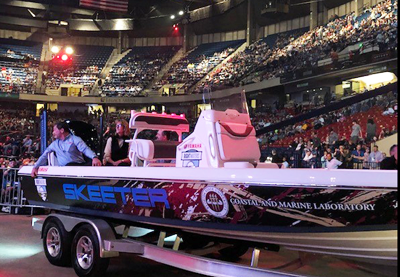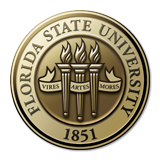
In the heart of the Florida Panhandle, researchers at the Florida State University Coastal and Marine Laboratory (FSUCML) are diligently working to understand the causes of decline in oyster populations of Apalachicola Bay and to develop a sustainable management and restoration plan for their recovery.
Joining their mission, Yamaha Marine and Skeeter Products, Inc. recently provided FSUCML a new vessel for their fleet, ensuring the lab is sufficiently equipped to conduct the ecological research necessary to restore the Apalachicola Bay System.
The Skeeter SX230 console boat is sponsored by Yamaha Rightwaters™, a new nationwide initiative that builds on the organization’s longstanding leadership and commitment to environmental stewardship, sustainability and conservation. The vessel will have an instrumental role in FSU’s Apalachicola Bay System Initiative’s (ABSI) extensive research efforts surrounding the collapse of the bay’s oyster habitats.
“Two of Yamaha Rightwaters’ main objectives are to support both habitat restoration and scientific research,” Yamaha Senior Specialist of Government Relations John O’Keefe shared. “After my initial visit, we were interested in exploring how the lab’s research could fit into the parameters for the soon-to-be-announced Yamaha Rightwaters. With their goals through the ABSI, a sponsorship seemed tailor-made.”
Prior to the Deepwater Horizon oil spill in 2010, the Apalachicola region of the Gulf of Mexico was recognized as the leading producer of Florida’s oyster supply and the central economic pillar for Franklin County, Florida. The five-year grant, funded by Triumph Gulf Coast, Inc. and Florida State University, allows scientists at FSUCML to study the root causes of the deterioration of the system’s oyster reefs.
“I couldn’t be more appreciative to have respected industry leaders such as Yamaha Marine and Skeeter Products supporting FSUCML’s ongoing efforts to rehabilitate the bay and its oyster population,” Scientific Director of the Apalachicola Bay Systems Initiative Sandra Brooke expressed. “This addition to the lab’s fleet allows us to greatly expand our scope of work as we strive to better understand this vulnerable system and similar ecosystems across our globe.”
“Seventy percent of our customers fish, so it only made sense to sponsor with an institution doing valuable research positively impacting their interests,” O’Keefe added. “The boating and fishing industries will not be the only ones who benefit from the innovative work research universities [like Florida State University] are conducting. Pairing with such institutions is a wise investment for the future, and we look forward to a long and mutually-beneficial relationship with FSU and the Marine Lab.”
The mission of FSUCML is to conduct innovative, interdisciplinary research on coastal and marine ecosystems, to mentor the next generation of problem solvers and to leverage scientific outcomes and expertise through engagement with stakeholders to optimize marine management and conservation.
Visit the FSU Coastal and Marine Laboratory online to learn more about their operations and ways to support.
